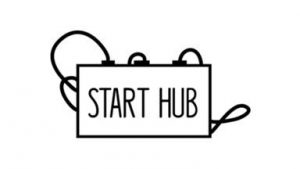Four lessons from the start-up scene in Berlin
Thom van Wijk – STARTHUB OVERTOOM
Last week I flew to Berlin with Boudewijn van der Sar (Workspot) and Robbin Reijnen (Wonderlab) to interview entrepreneurs and see co-working spaces and incubators. Main goal: to get answers on how to create the best possible eco-system for startups and medium sizes enterprises.
Lesson 1: Co-working starts with good coffee, always…
We start our trip at the first ever co-working space in the World: St. Oberholz. Are we at holy ground? Founded in 2005, well before WeWork and the likes. Tobias Schwarz runs this cafe combined with desks, team-rooms and meeting spaces. The first thing we see is a coffee shop. And we see it at every other place we visit. Many of the co-workingspaces partner with local coffee chains. It makes me wonder, when will we see Starbucks ‘own brand’ of co-working space? A place without cheesecake eating grannies, screaming toddlers, or chit-chatting students. Just a place to co-work?
Lesson 2: Frow co-work to co-live?
Tobias continues his story. He sees a growing demand for startups that want to work and live at the same place. He currently has two apartments on the top floor, which he rents out to scale-ups who want to have full focus on growing their business. They even have startups inviting their investors to stay with them for a week. So the investor can really get close to the action and watch their investment at work. For a small country like the Netherlands, where work and live are never more than a one hour commute apart, this doesn’t seem necessary. Though WeWork is betting heavily on its first ‘co-living’ space. Along with living accommodations, residents will have acces to community events like fitness classes, services like cleaning and laundry and a digital social network. As a leaked investor presentation suggests WeWork is betting heavily on its new co-living venture, WeLive.
Lesson 3: Avoid incubators
Later on we find ourselves at the HQ of Nestpick with Founder and CEOFabian Dudek. Frustrated with the lack of transparency in renting a long-stay apartment in Rotterdam during his study exchange back in 2011 he started an online platform. Firmly believing that people will be renting and letting their homes 100% online in the future. Five years later, and funded by Rocket Internet he is making a leap for it. And by the looks of his office at Unter den Linden, this is going pretty well. Though he doesn’t care about his office; even worrying the firm exposes itself for having too much money to spend.
He shares his lesson: the best place for an expanding startup is not an incubator. Most incubators are mainly there for themselves, and your shares (8% is not unusual), their advice to generic. Avoid them is Fabian’s advice, find peers to learn from (like startyourbusinessonaboat with Jasper Mutsaerts and Tom Elffers), have a strong focus and surround yourself with the right people. As he attracted sales talent from AirBnB to run his sales teams.
Lesson 4: Small, attracts big
We finish the first evening at the Berlin Factory. The Factory is a massive building that includes funding from Google for Entrepreneurs. “I want robots, I wants drones flying around,” says founder Simon Schaefer, bounding into a meeting room on the top floor of the main Factory building, waving an espresso. We are here to attend the 1776 Challenge Cup. A confrontation between startups seeking to find investments. The place looks great, the event well organized, the smell of corporate money is palpable. Bigger business are working with co-working spaces to support, or capture startups as new clients.
Little newsflash, Rabobank will soon collaborate with Starthub. Sending their local branch managers to Starthub, not wearing suits and ties, but faded jeans, being one with the crowd!


